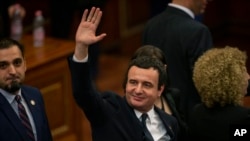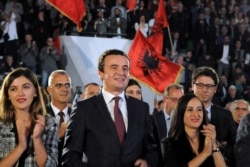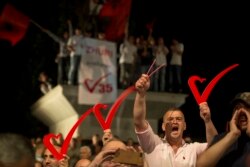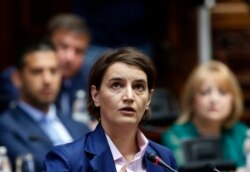Kosovo’s parliament Monday confirmed Prime Minister Albin Kurti, a former student leader, almost four months after a political upset that saw his party with the most seats in a snap election.
The new government is a coalition between Kurti’s center-left Vetëvendosje (Self-Determination ) party and the center-right Democratic League of Kosovo (LDK) party, which won just slightly fewer votes than Vetëvendosje.
The 120-seat Assembly approved the new government with 66 votes in favor.
Kosovo’s Democratic Party, of which President Hashim Thaçi is a former leader, which will for the first time become the opposition, boycotted the vote, as did other opposition parties.
The opposition party members walked out of the chamber after criticizing Kurti in speeches throughout the day.
Kurti campaigned on an anti-corruption platform and said Monday that his government will focus on development and employment.
Women will head 30% of the Cabinet posts. The parliament also voted for Kosovo’s first-ever female speaker, Vjosa Osmani of coalition partner LDK, as part of the power-sharing agreement.
Who is Kurti?
Kurti, 44, is the former leader of a student movement with a nationalist focus.
He became an activist in 1997, protesting against Serbian control of education institutions, at a time when Kosovo was a province of Serbia and seeking independence. He was one of the leaders of a protest that was violently crushed by Serbian forces.
In April 1999, while a NATO campaign was underway to stop ethnic cleansing by Serbian forces in Kosovo, Kurti was arrested by those forces and later was transferred in Serbia, along with thousands of Albanian prisoners.
In 2000, a Serbian court sentenced him to 15 years in prison, but under international pressure, he was released in 2001.
In 2003, he was engaged in an activist movement aiming at social change and citizen involvement that later became the Vetëvendosje Movement. Kurti became its leader.
The name, which means self-determination, reflected the movement’s central political position.
He was arrested several times during the group's protests. In February 2007, a protest turned violent, resulting in two deaths.
After Kosovo declared its independence, Vetëvendosje became a political party, but it continued its activism on the streets.
As a political party, Vetëvendosje continued to be against any negotiations with Serbia to normalize relations, a condition for both countries to be able to pursue European integration.
In 2017, the party won 32 out of 120 seats in elections. And last year’s win marks the biggest change in the political scene since Kosovo declared independence.
For a time, relations between Vetëvendosje and the West were frosty, due to its positions, including one for unification with Albania.
But lately, relations appear to be thawing, as analysts observe Kurti’s positions have been more moderate.
Kosovo-Serbia dialogue
Negotiations with Serbia remain one of the main challenges facing the new prime minister and his government.
Kurti addressed it in his speech, saying he would be ready for talks with Serbia. However, he said the premise of those talks would be that Kosovo is a sovereign country.“
The dialogue will be for issues of bilateral and good neighborly relations, including the issue of missing people, war and occupation reparations, and for mutual recognition of the two countries,” he said.
One of the most pressing issues is a 100% tariff on all Serbian goods that former Prime Minister Ramush Haradinaj imposed in 2018, as retaliation for Belgrade’s refusal to recognize Kosovo’s independence.
Kurti said, "We will bring full trade, economy and political reciprocity” with Serbia.
Serbian Prime Minister Ana Brnabic said she is willing to meet with Kurti, but that the relationship with the new government will depend on the implementation of the already reached EU-mediated agreements, and their conduct toward what she called "illegal taxes."
Daniel Serwer, director of the conflict management program at Johns Hopkins School of Advanced International Studies, addressed the new prime minister in a blog entry.“
The start of your mandate is the ideal time to suspend the tariffs, in exchange not only for the visa waiver and an end to the derecognition campaign, but also Serbian implementation of the several Pristina-Belgrade agreements, especially the one on energy,” he wrote.
U.S. Ambassador to Germany Richard Grenell, who also serves as White House special envoy for the Kosovo-Serbia talks, visited both countries in the past two weeks, urging a resumption of talks.
Keida Kostreci contributed to this report from Washington.











